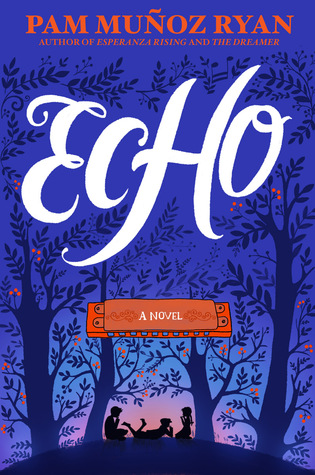At our last meeting everyone liked parts of Echo by Pam Munoz Ryan, but only a couple of us truly loved all of it. We all agreed that it was quite an amazing undertaking for the author to write, in essence, three different stories, set in three different times and places, tied together by one old harmonica, and we commended her for that. Several people said they loved the first two stories, about Friedrich and Michael, but didn't love the final story about Ivy in the 1940s. They didn't feel it was realistic that she would receive the harmonica, and they thought the information about school segregation in Orange County at that time and the Japanese-American Internment during World War II was somewhat didactic, and didn't really add much to the story. Some also felt the final chapter, when the three protagonists met at Carnegie Hall in 1955 was just too cliched and unrealistic. However a couple of us loved everything about the book: the fact that it was very 'fairy-tale-ish' -- with things in threes, with magic, and with a happily ever after ending. We felt young readers would like that also, and that maybe today's kids need to read things with happy endings. We also felt that the information related to WWII was helpful, and would give readers some necessary information about that time in history which might spur them to do further research.
We all loved the illustrations by David Roberts in Andrea Beaty's Rosie Revere, Engineer. We loved all of the explicit details in each picture, even including Maurice Sendak's 'Wild Thing,' and felt it could serve as a read-aloud that would encourage young children to observe carefully and describe what they saw. But -- we didn't feel the same way about the writing, and no-one loved the attempt at the 'Seussian' rhyming. Everyone thinks they can be Dr. Seuss, but -- in reality -- usually they can't. We felt some of the rhymes were stilted -- and included wording to move the story along, but the end result in the rhymes was less than wonderful. We liked the idea of 'Rosie' figuring out that she could continue tinkering and building weird things, and could become who she wanted to become, but we thought the last page which showed everyone in her class building strange things was just kind of thrown in, with no prior explanation or introduction. So -- yaaayyyy for the illustrations, less so for the writing.
WELCOME
WELCOME! For the last 19 years, about once a month, usually on a Thursday evening, a group of writers, illustrators, teachers and librarians meets in the Los Feliz area of Los Angeles to discuss children's books. Lately we have started meeting at lunch time, once every three months. Usually we talk about one picture book and one middle grade or YA novel. After the meeting, Sandy Schuckett, a retired LAUSD librarian, summarizes our discussion. Here are her reports of our thoughts about the books we have read. We'd love to have your comments too!
Thanks to Nancy Hayashi for our wonderful title art! NOTE: We are changing to a new schedule. Our meetings will now be quarterly and during the afternoon. Our group has been meeting since 2007. It was organized under the auspices of the Children's Literature Council of Southern California (CLCSC).
Thanks to Nancy Hayashi for our wonderful title art! NOTE: We are changing to a new schedule. Our meetings will now be quarterly and during the afternoon. Our group has been meeting since 2007. It was organized under the auspices of the Children's Literature Council of Southern California (CLCSC).

